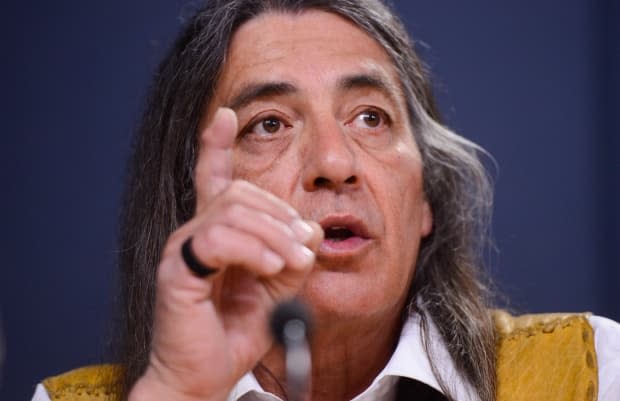Kanesatake Mohawk grand chief faces backlash after calling for end to rail blockades
A small group of Kanesatake Mohawks locked out the grand chief and his council from the administrative office of the First Nations community near Oka, Que., Tuesday — angry at the elected leader's pleas for an end to blockades that have paralyzed rail traffic across the country.
Kanesatake Grand Chief Serge Otsi Simon took part in a news conference in Ottawa Tuesday morning, alongside the Assembly of First Nations National Chief Perry Bellegarde and other First Nations chiefs.
At the news conference, Simon said he was "pleading with the protesters" to bring down the blockades that were set up as an act of solidarity with the Wet'suwet'en hereditary chiefs in B.C. who oppose the Coastal GasLink pipeline project running through their traditional territory.
A blockade in Tyendinaga Mohawk Territory, near Belleville, Ont., has shut down CN Rail in eastern Canada, and a blockade in Kahnawake, Kanesatake's sister community on Montreal's South Shore, has interrupted Canadian Pacific services that run through the territory.
"Have you made your point yet? Has the government and industry understood? I think they did," Simon said.
"Bringing down the blockades doesn't mean that you surrender. It doesn't mean we're going to lay down and let them kick us around. No, it would show compassion."
Simon made similar comments Monday evening on local radio in his home community, which prompted half a dozen people in Kanesatake to show up at the band council office Tuesday morning, where they padlocked the door and lit a bonfire outside.
They held up signs that questioned Simon's authority.
"Serge Simon you are not the voice of Kanehsatà:ke," one sign read.
"Solidarity with hereditary chiefs of Wet'suwet'en," read another.

Remember Oka Crisis: protesters
Kanesatake, about 65 kilometres northwest of Montreal, was the Mohawk community at the centre of the Oka Crisis in 1990.
That dispute, which began over the proposed expansion of a municipal golf course, took a violent turn when provincial police moved in on a Mohawk protest camp to enforce an injunction. A police officer was shot and killed.
The confrontation precipitated the closure of the Mercier Bridge, the CP rail line and highways through both Kanesatake and Kahnawake — and led to a 78-day standoff with police and the Canadian army.
The protesters outside the Kanesatake band office said Simon's comments failed to acknowledge that history.
"In 1990, we had the support of Indigenous people from the whole country," John Harding, one of the protesters, told Radio-Canada. "So we wanted to tell our brothers and sisters that we're in solidarity with them."
Legitimacy of band councils questioned
A key issue in the crisis in Wet'suwet'en is the divide between members of the elected band council, many of whom support the pipeline project, and hereditary chiefs, who oppose it.
The legitimacy of elected band councils, a creation the federal government set out in the Indian Act, is contested in many First Nations communities, including in Kanesatake.
While Simon's leadership has been called into question before, Harding said the issue this time involves his failure to consult the community before issuing the call for blockades to come down.
"He spoke as if that was the community's position. But that's not true. It's not like that at all," Harding said. "That's not our way of governing."

He said he would like the community to seek a confidence vote in Simon's leadership.
Simon met with the protesters later Tuesday. He said he tried to persuade them he was acting in the best interests of the Mohawk community.
"They perceived it more like I'm giving up. And that's not the case at all," Simon told CBC's As It Happens.
"The blockades could be making it more difficult for any discussions or progress to be had. That's why I'm just asking ... if maybe there is another way that could help the Wet'suwet'en people."
Legault alludes to 'deadline' for peaceful solution
The Quebec government, meanwhile, continued to express its displeasure with Prime Minister Justin Trudeau's response to the rail blockades and stressed the urgency of finding a solution.
Premier François Legault said Trudeau's address to the House of Commons Tuesday offered nothing new, even as the economic impact of the blockades grew.

Blocked rail lines mean ships arriving at the Port of Montreal haven't been able to offload their cargo onto trains. The port, Legault said, was running out of space for incoming ships.
(The port authority responded to that declaration in a news release later Tuesday, saying there is no space shortage at the moment and the "situation is manageable.")
"We have to put a deadline" for finding a peaceful solution, Legault said, although he stopped short of calling on the federal government to use force to remove protesters.
The premier appeared to hold up Simon's comments as a justification for his position.
"I've seen and discussed with some communities. Some Indigenous communities want us to open the railways," Legault told reporters in Quebec City.


